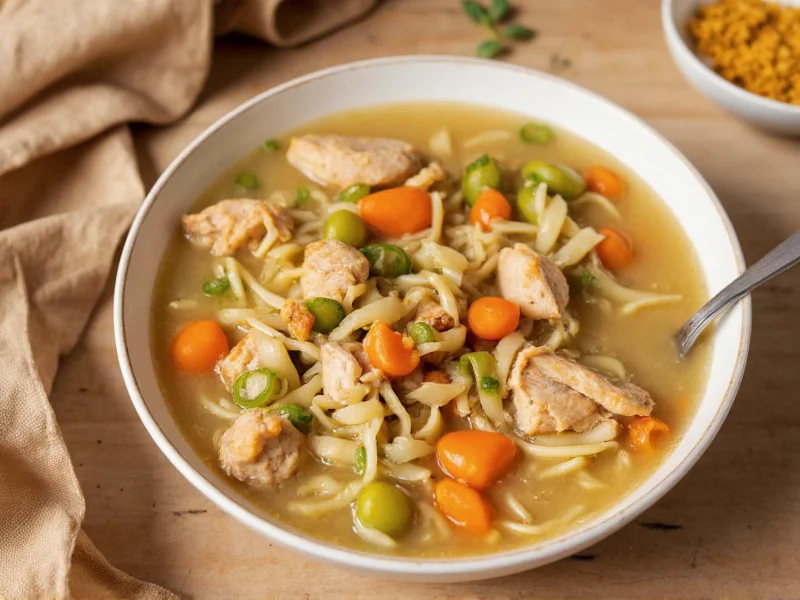When your canine companion isn't feeling well, it's natural to consider chicken noodle soup as a comforting remedy. However, understanding is chicken noodle soup safe for dogs requires careful examination of ingredients and preparation methods. While plain chicken broth can provide hydration and nutrients during recovery, many common soup ingredients pose serious health risks to dogs.
Breaking Down Chicken Noodle Soup Components for Dogs
Commercial chicken noodle soup typically contains several ingredients that make it unsuitable for canine consumption. Let's examine each component:
| Ingredient | Safe for Dogs? | Reason |
|---|---|---|
| Plain chicken (boneless, cooked) | Yes | Excellent protein source when prepared properly |
| Chicken broth (homemade, low-sodium) | Yes | Hydrating and can stimulate appetite in sick dogs |
| Onions, garlic, chives | No | Highly toxic, cause hemolytic anemia |
| Excessive sodium | No | Can lead to sodium ion poisoning |
| Egg noodles | Occasionally | Not toxic but offers little nutritional value |
| Herbs (thyme, parsley) | Mostly yes | Generally safe in small amounts |
Why Most Store-Bought Chicken Noodle Soups Are Dangerous
When considering what kind of chicken soup can dogs eat, it's crucial to understand that nearly all commercial chicken noodle soups contain onion and garlic powder. These ingredients, while enhancing flavor for humans, are extremely toxic to dogs. Even small amounts can cause onion toxicity, leading to hemolytic anemia where red blood cells are destroyed faster than they can be replaced.
Additionally, store-bought soups typically contain 800-1,200mg of sodium per serving—far exceeding the recommended daily sodium intake for dogs. High sodium content can cause:
- Excessive thirst and urination
- Vomiting and diarrhea
- Tremors and seizures in severe cases
- Potentially fatal sodium ion poisoning
When Chicken Broth Can Benefit Dogs
Despite the risks of commercial soups, chicken broth for dogs with upset stomach can be beneficial when prepared correctly. Veterinarians often recommend plain, low-sodium chicken broth for:
- Hydrating dogs with diarrhea or vomiting
- Stimulating appetite in sick or recovering dogs
- Adding flavor to prescription diets
- Providing electrolytes during mild illness
A 2022 study published in the Journal of Veterinary Nutrition found that dogs recovering from gastrointestinal illness showed faster appetite recovery when offered diluted chicken broth compared to water alone. However, the study emphasized using broth completely free from onions, garlic, and excessive salt.
Creating Dog-Safe Chicken Broth: A Simple Recipe
If you're wondering can dogs eat homemade chicken soup, the answer is yes—with proper preparation. Here's a veterinarian-approved recipe:
Ingredients:
- 1 pound boneless, skinless chicken breasts
- 8 cups filtered water
- Optional: 1/4 cup cooked carrots (finely chopped)
- Optional: 1/4 cup cooked green beans (finely chopped)
Instructions:
- Place chicken and water in a large pot
- Bring to a gentle simmer (do not boil vigorously)
- Cook for 20-25 minutes until chicken is fully cooked
- Remove chicken and shred (can be returned to broth or served separately)
- Cool completely and refrigerate for 24 hours to remove fat layer
- Serve chilled or gently warmed (never hot)
For dogs with sensitive stomachs, strain the broth to remove all solid particles. The sodium content in chicken soup for dogs should be minimal—never add salt during preparation.
Important Safety Considerations
Before offering any broth to your dog, consider these critical safety points:
- Portion control: Small dogs (under 20 lbs) should have no more than 1/4 cup; medium dogs 1/2 cup; large dogs up to 1 cup per serving
- Frequency: Limit to 2-3 times weekly as a supplement, not a meal replacement
- Temperature: Always serve cooled to room temperature
- Monitoring: Watch for allergic reactions or digestive upset
- Medical conditions: Avoid in dogs with pancreatitis or kidney disease without veterinary approval
When to Consult Your Veterinarian
While plain chicken broth can be a helpful supplement, it's not a substitute for professional veterinary care. Contact your vet immediately if your dog shows:
- Continuous vomiting or diarrhea lasting more than 24 hours
- Blood in vomit or stool
- Lethargy or weakness
- Refusal to eat for more than 24 hours
- Signs of abdominal pain
Using homemade dog food recipes with chicken should always be discussed with your veterinarian, especially if your dog has underlying health conditions. They can provide guidance on appropriate nutritional balance and portion sizes specific to your dog's needs.
Recognizing Onion Toxicity in Dogs
Onion toxicity is one of the most serious risks when feeding dogs inappropriate chicken soup. Symptoms may not appear immediately and can include:
- Weakness and lethargy
- Pale or yellow-tinged gums
- Rapid breathing
- Dark urine (resembling cola)
- Vomiting
- Decreased appetite
If you suspect your dog has consumed onion or garlic, contact your veterinarian or animal poison control immediately. Early intervention significantly improves outcomes.











 浙公网安备
33010002000092号
浙公网安备
33010002000092号 浙B2-20120091-4
浙B2-20120091-4